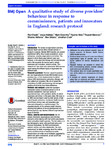A qualitative study of diverse providers' behaviour in response to commissioners, patients and innovators in England: research protocol
| dc.contributor.author | Sheaff, Rod | |
| dc.contributor.author | Halliday, J | |
| dc.contributor.author | Exworthy, M | |
| dc.contributor.author | Allen, P | |
| dc.contributor.author | Mannion, R | |
| dc.contributor.author | Asthana, Sheena | |
| dc.contributor.author | Gibson, Alexander | |
| dc.contributor.author | Clark, Jonathan | |
| dc.contributor.author | Sheaff, WR | |
| dc.date.accessioned | 2016-05-16T12:10:00Z | |
| dc.date.available | 2016-05-16T12:10:00Z | |
| dc.date.issued | 2016-05-01 | |
| dc.identifier.issn | 2044-6055 | |
| dc.identifier.issn | 2044-6055 | |
| dc.identifier.other | ARTN e010680 | |
| dc.identifier.uri | http://hdl.handle.net/10026.1/4643 | |
| dc.description.abstract |
INTRODUCTION: The variety of organisations providing National Health Service (NHS)-funded services in England is growing. Besides NHS hospitals and general practitioners (GPs), they include corporations, social enterprises, voluntary organisations and others. The degree to which these organisational types vary, however, in the ways they manage and provide services and in the outcomes for service quality, patient experience and innovation, remains unclear. This research will help those who commission NHS services select among the different types of organisation for different tasks. RESEARCH QUESTIONS: The main research questions are how organisationally diverse NHS-funded service providers vary in their responsiveness to patient choice, NHS commissioning and policy changes; and their patterns of innovation. We aim to assess the implications for NHS commissioning and managerial practice which follow from these differences. METHODS AND ANALYSIS: Systematic qualitative comparison across a purposive sample (c.12) of providers selected for maximum variety of organisational type, with qualitative studies of patient experience and choice (in the same sites). We focus is on NHS services heavily used by older people at high risk of hospital admission: community health services; out-of-hours primary care; and secondary care (planned orthopaedics or ophthalmology). The expected outputs will be evidence-based schemas showing how patterns of service development and delivery typically vary between different organisational types of provider. ETHICS, BENEFITS AND DISSEMINATION: We will ensure informants' organisational and individual anonymity when dealing with high profile case studies and a competitive health economy. The frail elderly is a key demographic sector with significant policy and financial implications. For NHS commissioners, patients, doctors and other stakeholders, the main outcome will be better knowledge about the relative merits of different kinds of healthcare provider. Dissemination will make use of strategies suggested by patient and public involvement, as well as DH and service-specific outlets. | |
| dc.format.extent | e010680-e010680 | |
| dc.format.medium | Electronic | |
| dc.language | en | |
| dc.language.iso | en | |
| dc.publisher | BMJ | |
| dc.subject | QUALITATIVE RESEARCH | |
| dc.title | A qualitative study of diverse providers' behaviour in response to commissioners, patients and innovators in England: research protocol | |
| dc.type | journal-article | |
| dc.type | Journal Article | |
| dc.type | Research Support, Non-U.S. Gov't | |
| plymouth.author-url | https://www.webofscience.com/api/gateway?GWVersion=2&SrcApp=PARTNER_APP&SrcAuth=LinksAMR&KeyUT=WOS:000378414700067&DestLinkType=FullRecord&DestApp=ALL_WOS&UsrCustomerID=11bb513d99f797142bcfeffcc58ea008 | |
| plymouth.issue | 5 | |
| plymouth.volume | 6 | |
| plymouth.publication-status | Published | |
| plymouth.journal | BMJ Open | |
| dc.identifier.doi | 10.1136/bmjopen-2015-010680 | |
| plymouth.organisational-group | /Plymouth | |
| plymouth.organisational-group | /Plymouth/Faculty of Arts, Humanities and Business | |
| plymouth.organisational-group | /Plymouth/Faculty of Arts, Humanities and Business/School of Society and Culture | |
| plymouth.organisational-group | /Plymouth/Faculty of Health | |
| plymouth.organisational-group | /Plymouth/Faculty of Health/Peninsula Medical School | |
| plymouth.organisational-group | /Plymouth/REF 2021 Researchers by UoA | |
| plymouth.organisational-group | /Plymouth/REF 2021 Researchers by UoA/UoA20 Social Work and Social Policy | |
| plymouth.organisational-group | /Plymouth/Research Groups | |
| plymouth.organisational-group | /Plymouth/Research Groups/FoH - Community and Primary Care | |
| plymouth.organisational-group | /Plymouth/Research Groups/Institute of Health and Community | |
| plymouth.organisational-group | /Plymouth/Research Groups/Plymouth Institute of Health and Care Research (PIHR) | |
| plymouth.organisational-group | /Plymouth/Users by role | |
| plymouth.organisational-group | /Plymouth/Users by role/Academics | |
| plymouth.organisational-group | /Plymouth/Users by role/Researchers in ResearchFish submission | |
| dc.publisher.place | England | |
| dcterms.dateAccepted | 2016-04-05 | |
| dc.identifier.eissn | 2044-6055 | |
| dc.rights.embargoperiod | Not known | |
| rioxxterms.versionofrecord | 10.1136/bmjopen-2015-010680 | |
| rioxxterms.licenseref.uri | http://www.rioxx.net/licenses/all-rights-reserved | |
| rioxxterms.licenseref.startdate | 2016-05-01 | |
| rioxxterms.type | Journal Article/Review | |
| plymouth.oa-location | http://bmjopen.bmj.com/content/6/5/e010680.full?keytype=ref&ijkey=y0P5Yp0aNFY7krW |


